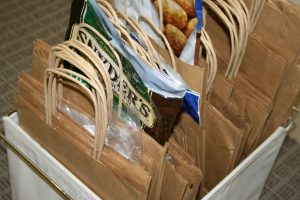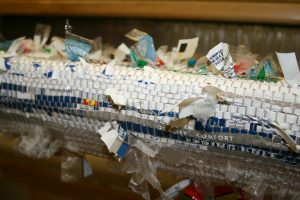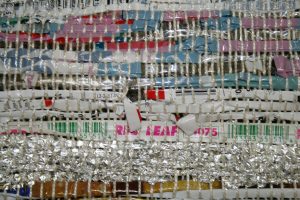I thought it would be a fun exercise to place all of my non-organic, non-recyclable, or readily repurposed trash into a paper bag daily for an entire month. In order to obtain a visual representation of my personal consumption practices, I elected to cut all of my trash into strips and weave those strips into a rag rug.
Although the initial premise of this exercise was to weave a visual representation of my wastefulness on a monthly basis, I learned much more.

uncut packaging
I quickly learned that my eating whims have consequences. On the first day of this project, I ordered a pizza. That pizza was the first pizza and the last pizza that I had ordered that month. My hand was almost blistered by the time I had cut the entire pizza box into strips.

Pizza box
As the month of my trash collecting got underway, I realized that there was a direct correlation between the degree of processed food and the amount of packaging. I also realized that I would walk into a large supermarket, place my groceries into a shopping cart, use self-check out, get into my car, and drive home without having spoken to anyone.
In time I realized that if I purchased meat from a butcher, produce from a farmer’s market, or fish from a fish market that there was much less packaging involved. Not only were there less packaging, but purchasing food from people, members of my community gave me the opportunity to speak, support, and interact with people instead of a machine. Also I was purchasing food that was usually locally grown and or sourced. I was supporting my local community and less fossil fuel was used transporting commercially processed food from across the country and around the world.

on the loom
What would happen I ponder if every weaver wove his or her trash for 30 days? What would happen if weavers taught and encouraged non-weavers to also take the 30 day trash weaving challenge?

More woven trash
My supposition is that weavers could directly affect social change, help create a healthier environment, and build community while reducing waste our dependence upon fossil fuels.
Weave your trash for a healthier more socially engaged you!
Pavlos Mayakis, M.F.A. www.pavlosmayakis.com is the Fiber Arts Coordinator at the Mendocino Art Center. He also teaches in the art department at Mendocino College. Pavlos is the 2016 awardee of the Champion of the Arts in the Educator category by the Arts Council of Mendocino. He is a member artist of Northcoast Artists Gallery and will be having a solo exhibition there for the month of November.